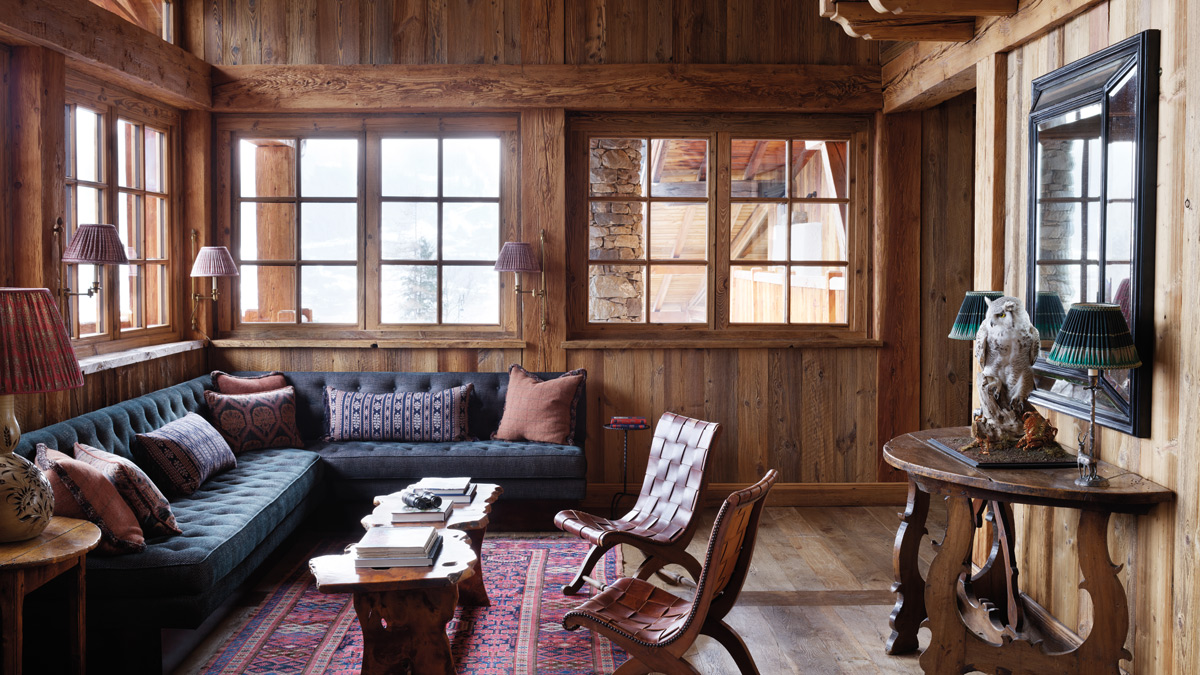
irst came the beacon: a red canvas strap looped around my right shoulder, holding in place the homing device by which rescuers could locate me in case of an avalanche. Next, the backpack: a parachute-like contraption outfitted with a ripcord to be pulled as a preemptive strike, triggering a massive balloon designed to “float” me to the snow’s surface. (I was told, in no uncertain terms, that the cord must not be pulled inside the helicopter.)
Ominous as its various implications were, the gearing-up process for my day of heli-skiing was more reassuring than it was intimidating. Until it came time for the harness.
“What’s this for?” I asked while my guide, Jean-Noël Gaidet, cinched the harness’s straps around my legs and waist.
“In case you fall into a crevasse,” he replied, expressionless.
Crevasses, avalanches, high-altitude helicopter flights—there are plenty of good reasons not to go heli-skiing. Any serious risks, however, are greatly mitigated by established outfitters like Eleven, the adventure company that was leading my excursion along the French-Italian border. A more pressing, realistic concern for many would-be participants is heli-skiing’s perceived difficulty. The fear of being stuck in a situation you can’t get out of—peering over a precipice at the top of a blustery peak, beyond the reach of chairlifts and ski patrol—is enough to keep many skiers confined to resort slopes.
Such a fear might be justified in destinations like Alaska, British Columbia and Kamchatka. In the French-Italian Alps, however, a far more accessible experience awaits. Rather than hard-core, weeklong retreats to remote lodges, heli-skiing excursions in these parts are offered as day trips, one-off additions to otherwise normal winter holidays. The excursions cater to everyone from intermediates to experts, and typically conclude with a fabulous French or Italian meal, depending on which way you turn at the top.

Elevation: Eleven
I was staying with a group of skiers of varying abilities at Chalet Hibou, one of Eleven’s growing collection of boutique adventure properties worldwide. Founded by former Blackstone executive Chad Pike, Eleven pairs exhilarating outdoor activities with impeccable amenities at its lodges in Colorado, Chilean Patagonia, Iceland, New Zealand and beyond. Heli-skiing and fly fishing are the main attractions at several of the properties, many of which operate on an exclusive-use basis.
Hibou and its across-the-street neighbor, Chalet Pelerin, have 12 bedrooms between them and can be rented individually or as a pair. The chalets sit on a high slope in the Tarentaise Valley village of Le Miroir, at the top of a road so narrow and switch-backed that it requires a four-point turn to navigate at least one corner.
Inside the residences, wooden staircases connect the bedrooms and a collection of inspired spaces—a hidden bar, a music loft, a sitting room where a crackling fire accompanies après-ski cocktails. The room, as so many others in the chalets, opens to a balcony with fairy-tale views of pitched rooftops descending to the river valley below, then rising again toward towering peaks on the opposite slope.
Meals at the chalets embrace this magnificent milieu, with private chef–made breakfasts and dinners featuring local eggs, cheeses, lamb, duck—hearty French fuel for adventure-filled days. Those adventures might mean mountain biking, hiking, river rafting and canyoneering in the warmer months. My visit, in mid-January, came at the height of winter, prime season for snowshoeing, ice climbing, dogsledding and, of course, skiing.
Eleven’s chalets are within a short drive of several ski areas, including Sainte Foy and La Rosière. Our group spent the first two days at Val d’Isère and Tignes, sibling resorts spread over a massive swath of peaks and valleys near Mont Blanc. We started with easy groomed runs, but on day two, at Tignes, our guides graduated us to more challenging, off-piste terrain.
The ungroomed slopes offered the chance to make fresh tracks in day-old powder, as well as to become acquainted with our safety gear. Unbeknownst to us, they also served as a test—to see what we could handle in the day ahead.
Alpine Primed
Of the many differences between skiing in, say, the Rockies and the Alps—leisurely lunches of Dover sole and Sancerre, among them—most boil down to tradition. The Alpine cultures of France and nearby nations have been living in these parts for thousands of years, and the mountains are ingrained in who they are and what they do. The Alps are them, and they are the Alps.
Within that framework, the concept of heli-skiing becomes somewhat less intimidating. Should you really squeeze into a single-engine aircraft and fly through 14,000-foot peaks at breakneck speeds, only to then ski down those same crevasse-filled slopes? When you’re being guided by someone like Gaidet—a lifelong mountaineer who grew up in Le Miroir and now lives a couple doors down from Eleven’s chalets—your answer becomes yes.

Gaidet and his fellow guides err on the side of caution when it comes to heli-skiing routes. When conditions are good—as they were during our trip—the range of options is plentiful, from gently rolling slopes to high-pitch faces. As much as they can, the guides will pair you with similarly skilled skiers (four per helicopter, not including the guide) and select your drop-off locations and routes accordingly.
That doesn’t mean they’ll hold your hand on the way down. French mountain guides are, well, French. They might listen to you complain about your boots or how you’re too tired for another run—and then promptly ignore you and soldier on, not paying much attention to whether you’re behind them or not. The idea is that they have already gauged your abilities, outfitted you for safety and prepared you for your peak performance. The rest is up to you.
They have outfitted you for safety and prepared you for your peak performance. The rest is up to you.

Blanc Canvas
The night before taking flight, our group donned headlamps and hiked through the snow to Le Crot Alpage, a century-old sheepherder’s hut where Eleven hosts backcountry dinners. A feast that started with fondue by the fire—and ended with shots of génépi, the local digestif made from a high-altitude flower—would have been a worthy last meal.
Any cobwebs the next morning quickly dissipated during the gearing-up process, when the need to stay focused on our day of skiing became imminently clear. After suiting up, we drove to the base of La Rosière, where we took a series of lifts and groomed trails to the top. There, we turned and skied down to Espace San Bernardo, the connected resort on the Italian side of the border. (Heli-skiing is not permitted in France, but the fluid border with Italy makes it easy to access flight operators on the other side.)
We gathered at San Bernardo’s mid-mountain base and split into two groups of five. After another equipment check, we were prepared for the helicopter’s arrival: Drop to a knee behind the guide. Wear your gloves and hat tightly. (The powerful blade gusts knocked one of my skiing partners from a kneeling position to flat on her back in the snow at one point.) Board the helicopter one by one, in rapid succession, when the guide says go.
We could hear the helicopter before we could see it. Somewhere in the Alpine expanse, a chopper was headed our way, growing louder by the second. “I’m suddenly nervous,” said my German skiing partner—an expert skier—as the helicopter came into view.
Those nerves turned to adrenaline when we took off and sped low toward a distant ridge, with Mont Blanc looming to our left. San Bernardo’s chairlifts faded from view as we rose through a valley and up to our first drop-off point—a flat, snowy meadow at the top of the world.
Within seconds of being dropped, we were alone, the sun shining overhead and powder stretching in every direction below. Our guide started us down a gentle, wide-open slope, then led us through a shadowed valley, over a small ridge and into a sunny bowl. We were above the tree line and floating on air. It was, quite simply, the best run of my life. And then we did another.
Heli-skiing days in Italy can involve as many “laps” as you have time for, are willing to pay for and have the endurance to withstand. Indeed, the challenge of our route was more in the required stamina—skiing in knee-deep powder with very few breaks for nearly an hour straight—than it was in the difficulty of the runs (most of which would be blue-squared at an American ski resort).
At the top of our second drop, we had a choice: go one way down the mountain into France—where we could ski all the way to Chalet Hibou’s back door—or the other way into Italy. Given that our guides had booked a reservation at a popular inn near San Bernardo, our choice was clear.
After another epic run down the mountain, we regrouped for a long, lazy lunch of prosciutto, house-made pasta and Italian wine. But our day wasn’t over yet: At the end of the meal, we rushed back to San Bernardo, skiing with abandon toward France before the connecting lifts closed.
Arriving at the base of La Rosière, we peeled off our boots, beacons, backpacks and harnesses in the resort parking lot. In less than an hour, we were settled back at the chalet, safe and sound in the sitting room—and still buzzing from the high of heli-skiing.
Photography by Yann Allègre, courtesy of Eleven
Follow Us On


| Cookie | Duration | Description |
|---|---|---|
| cookielawinfo-checkbox-analytics | 11 months | This cookie is set by GDPR Cookie Consent plugin. The cookie is used to store the user consent for the cookies in the category "Analytics". |
| cookielawinfo-checkbox-functional | 11 months | The cookie is set by GDPR cookie consent to record the user consent for the cookies in the category "Functional". |
| cookielawinfo-checkbox-necessary | 11 months | This cookie is set by GDPR Cookie Consent plugin. The cookies is used to store the user consent for the cookies in the category "Necessary". |
| cookielawinfo-checkbox-others | 11 months | This cookie is set by GDPR Cookie Consent plugin. The cookie is used to store the user consent for the cookies in the category "Other. |
| cookielawinfo-checkbox-performance | 11 months | This cookie is set by GDPR Cookie Consent plugin. The cookie is used to store the user consent for the cookies in the category "Performance". |
| viewed_cookie_policy | 11 months | The cookie is set by the GDPR Cookie Consent plugin and is used to store whether or not user has consented to the use of cookies. It does not store any personal data. |